Remember our last post about the Pretty Rugged book, with jaw-dropping stories of women fishers in Maine? Now we’ve got one of the incredible photographers who captured the beautiful madness of it all. But there’s so much more to it than that.
Hannah McGowan is a documentary photographer specializing in digital and film (seen here!). What drew me to Hannah’s work is that she can catch moments in a grimy, sweaty job and make them look soft and graceful.
My favorite part of this interview (besides her images and the secrets she shares of working behind the lens) is how she compares the fishing, farming, and forestry industry in Maine. I’ve always wondered what the men and women who farm the land & sea have in common, and Hannah breaks it the F down: The danger, the glory, the guts (fish guts and cojones, if you know what I mean). So good! I can’t wait to hear what you think.
Without further ado, meet Hannah!
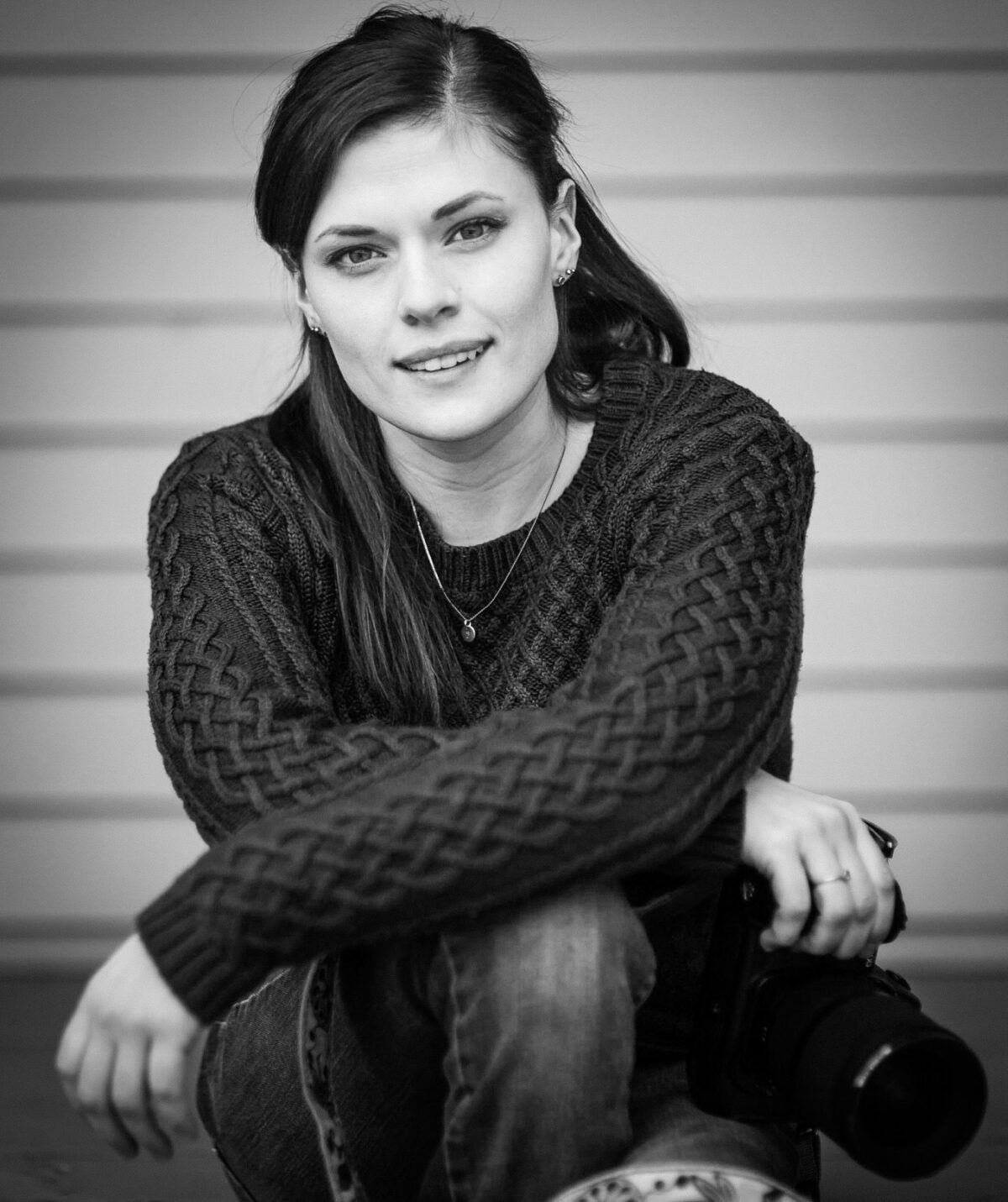
What was your first experience with commercial fishermen?
I first started shooting commercial fishermen for the author of a book (Pretty Rugged) here in Maine. My first shoot was with Ariel Gilley on her boat, the F/V Queen B out of Southwest Harbor. Another fisherman, Sarah Leiter, joined us for the shoot. I was totally unprepared for what kinds of shots I should be taking, but having grown up around heavy equipment, I knew enough to stay out of the way and listen up. I managed to keep my gear dry, but I was filthy and so happy by the end of that shoot! I was completely hooked. I heard some of the most special stories and learned so much about something I was completely ignorant about. I grew up only 45 minutes away from the coast, and somehow, I knew absolutely nothing about what it entails to be a Maine lobsterman. I knew I had to get back out there and be on the water with this community and keep learning and documenting. And thankfully, I got to continue documenting fishermen for the book for a year. I knew that I was there for a book initially, but it quickly became apparent that this newly opened door was one that I needed to step through fully.
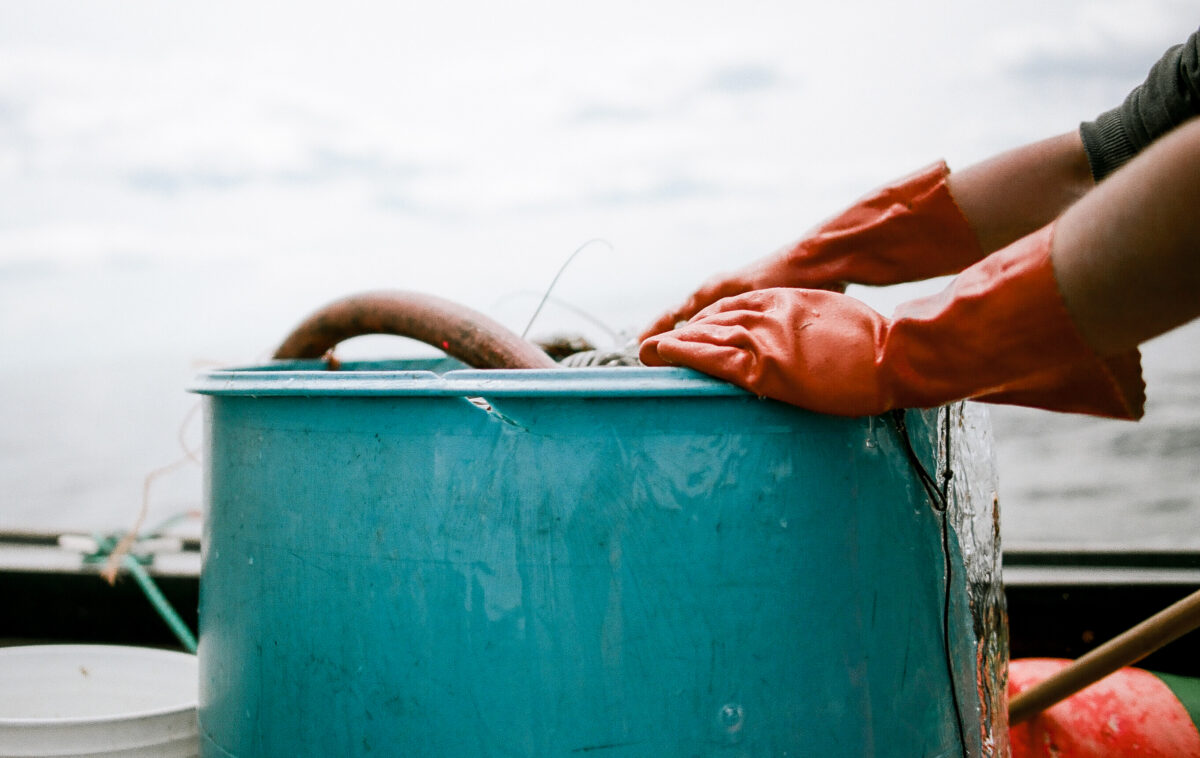
Growing up in a family of farmers and woodsmen, what similar values do you see with fishermen?
Yes, both sides of my family are filled with farmers and woodsmen! There is a good deal of logging and farming between the families – dairy, beef, and whatever else needed growing or raised in between. Most of them all cut and built from their own lands, my mother and father included. Farming, forestry, and fishing are at the core of Maine’s traditional industries. We even learned about them as the “Three F’s” in Maine History class in elementary school. But, they are definitely tied together in more ways than a history curriculum. I always like to joke with the fishermen that I meet that they’re a lot like us farm folk; they just have a bigger garden. We always chuckle, but there’s a lot of truth in it!
- A big similarity I see between the three groups is the ability to run and base an entire business upon a massively unpredictable and constantly changing set of variables. There’s always the unpredictability of the harvest, battling invasive species and disease, the struggle to keep equipment going, and the heavy reliance on Maine’s volatile weather. It requires a high level of dedication, flexibility, and enduring hardiness.
- Then, of course, there is the danger. A tree can twitch and end your life pretty quickly in a remote wood lot. Farming, fishing, and forestry equipment are big and powerful, which means danger. Have you ever stood near a tedder or bailer during hay season? Sawmills have so many moving parts that all could kill a man ten different ways in a matter of seconds. If you’re not sure how dangerous commercial fishing is, go ask a fisherman the worst storm they’ve weathered and how close they came to meeting their maker (or how many times). I guarantee they’ll all have some stories for you.
- Finally, let’s talk about the things that are not being thrown at these guys by nature or physical demands. Prices never hold, and product demand can be unpredictable. Land gets over-developed and is harder to keep or come by, and fishing grounds are snatched up in the name of progress and “green” initiatives. Plus, ever-rising taxes, tariffs, and regulations threaten livelihoods each passing year; things that are largely made by folks who have never stepped foot on a commercial fishing boat, twitched out a piece of timber or darkened the door of a milking parlor. Our farmers, fishermen, and woodsmen are seemingly held at the mercy of people who majorly and historically fail to see their intrinsic value and importance to the economy, environment, and communities.
It takes a special kind of person to balance heavy risks, physical exhaustion, and constant worry with some faith and perseverance. When your job isn’t simply a job but is your calling, the guts, and grit required to keep going become part of who you are. I have seen it for years in my own family, and I see it engrained in every fisherman I meet.
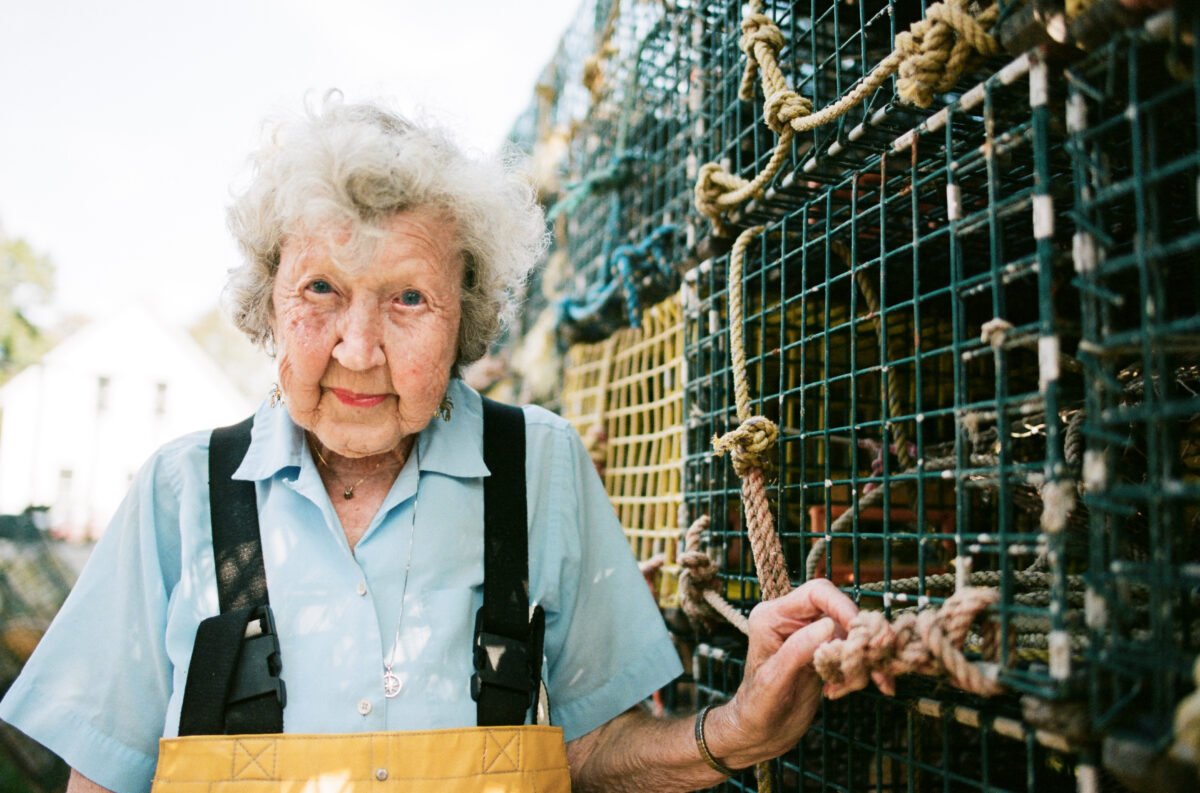
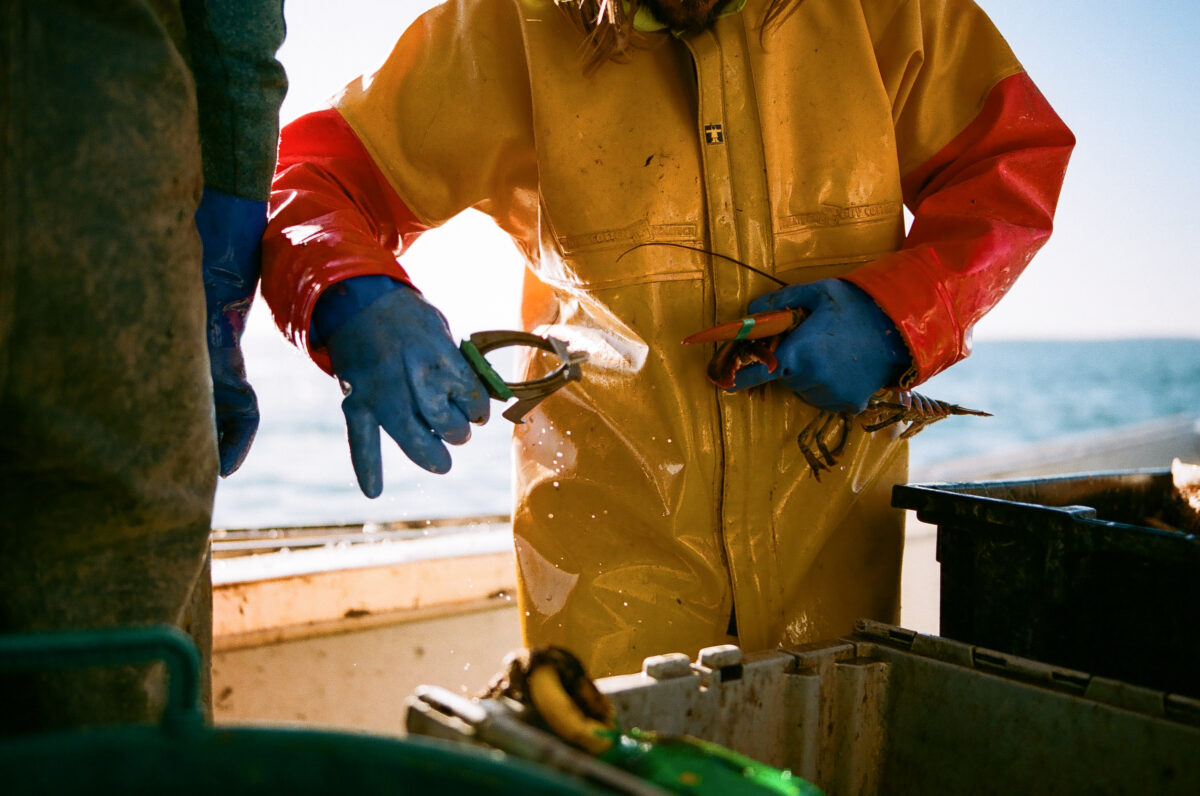
What is a unique aspect of photographing commercial fishing that people wouldn’t realize?
I can’t speak for other parts of the country, but I have learned that photographing fishermen is not about the images here in Maine. It’s about trust. You must be willing to forge real relationships built upon trust, respect, and gratitude. People may not immediately consider that when they get excited about shooting on a commercial fishing boat or even as a spectator in the harbor. However, lobstering is not kitschy and just for tourists to ogle. It’s hard, dangerous, and necessary work. So, as a photographer, are you willing to be humble and respect this centuries-old trade and its keepers? Or are you here to make a buck or two off a fisherman who, realistically, does not have time for you? Do not (I repeat) do not just “do it for the ‘gram.” Take the time to get to know people before you start shooting and making assumptions about their lives and trade; it will be far more valuable and honorable in the end.
What draws you to capture images of commercial fishermen?
I love hard workers. My Dad has been everything from a farmer, truck driver, mechanic, woodsman to a carpenter. There are several other things I haven’t listed there as well, but the point being, we grew up watching both of my parents work hard. They kept good food on the table and taught my sister and me that it’s important to take care of your family and those around you, even when it feels like you’re barely getting ahead. Growing up that way taught me to find beauty and comfort in watching people do hard, physical labor.
Commercial fishermen work so incredibly hard, and I think that the depth of the job and the intensity of the labor is something that keeps bringing me back for more. I love the water, the boats, and even the bait is beautiful in its own way, but the real magic for me lies with the work. Boats come alive when you’re out hauling. Watching the dance of the traps and the lines all being timed perfectly with the spin of the boat and the roll of the water is pretty magical. But that doesn’t happen on its own; it all comes down to the people. It all happens because a few fishermen get up before the sun and just get going for another day’s work. I always feel honored when I get to document that.
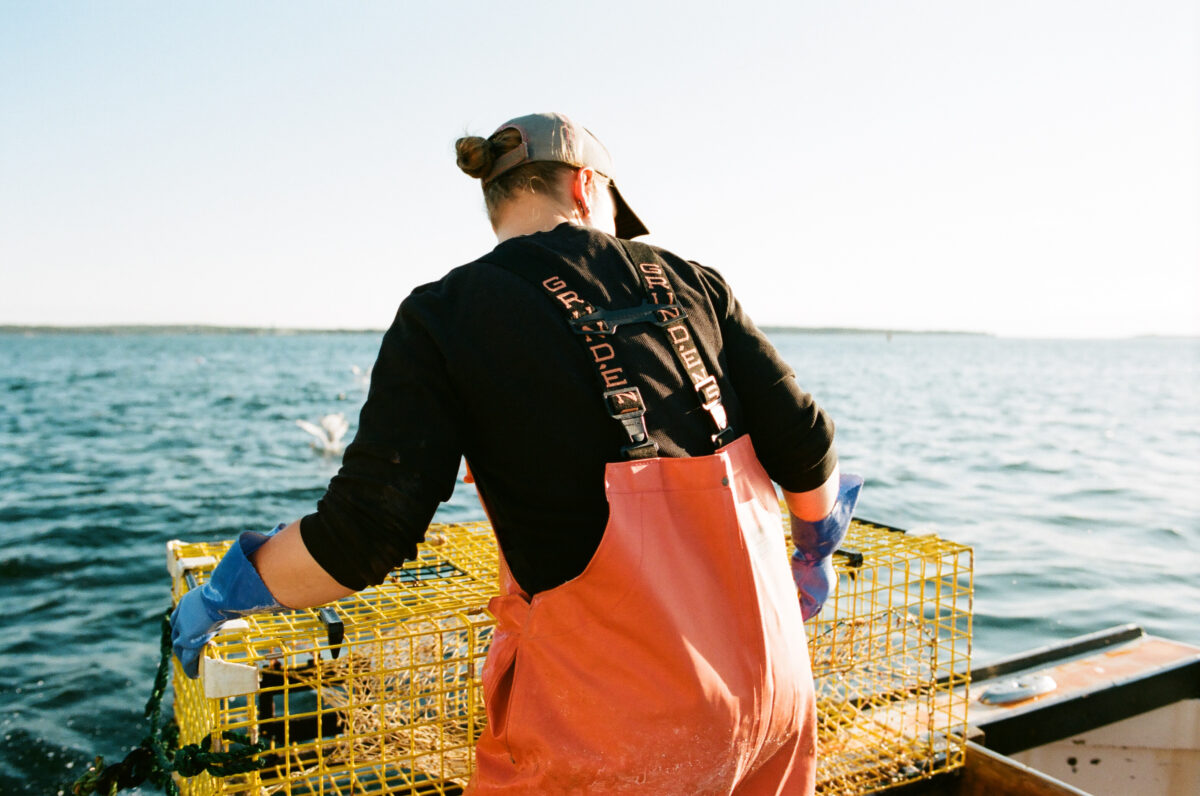
What do you hope viewers gain from your work?
I want people to feel invested in the stories I share – truly invested. I want people to see our harvesters and growers as real people with invaluable and irreplaceable skills and traditions. I also want people to see how invested they are in our future. They have a massive responsibility to provide for all of us while still planning for a sustainable future. That is a big calling and an ordainment of sorts. Our growers and harvesters are so important and needed in our world for very obvious reasons. They feed us!
I feel strongly that our nation needs to be asking itself some very serious questions. For example, why is beef from Argentina more accessible at the market when my friend Chelsea and her husband Brock are raising grass-fed, sustainable beef right here in the US in the sandhills of Nebraska? Why are we buying and drinking milk from Canada (because it’s cheaper!) when our friends, the Braggs, have an organic dairy farm less than 5 miles from my home? And this summer, at the peak of pandemic madness, why on earth were the lobsters in the tanks at my grocery store from Canada instead of here in Maine? Your pork and potatoes do not simply come from a store. The chair you’re sitting in didn’t just come from IKEA. Your fish does not just come from the ocean. Someone grew and/or harvested those precious goods and most likely shed tears and blood to do so – for you.
If my work can educate my viewers, help them feel connected to our growers and harvesters, or even shift how they think about where the fruits of the labor come from, then I’m doing alright.
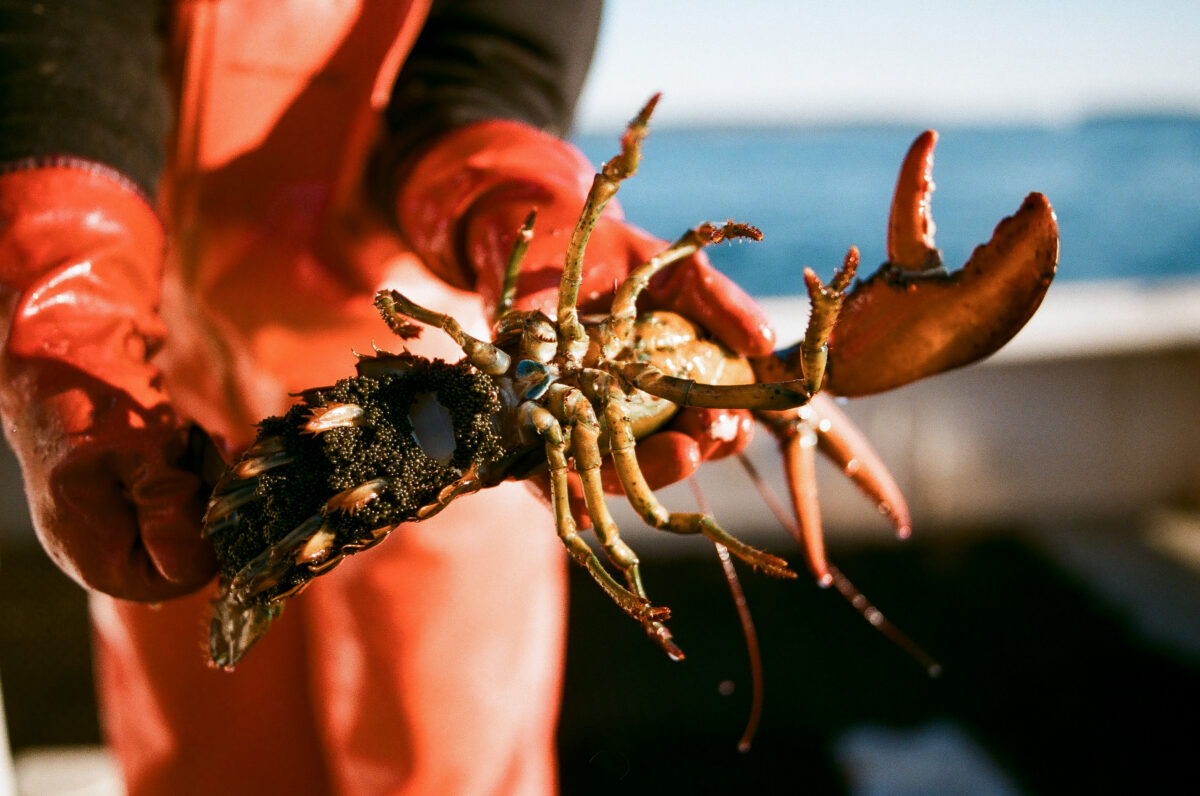
What’s your biggest takeaway from this piece? I would love to hear your thoughts in the comments below!
If you liked this, you’d love Life Hacks from a 3rd Generation Fisherman’s Wife.
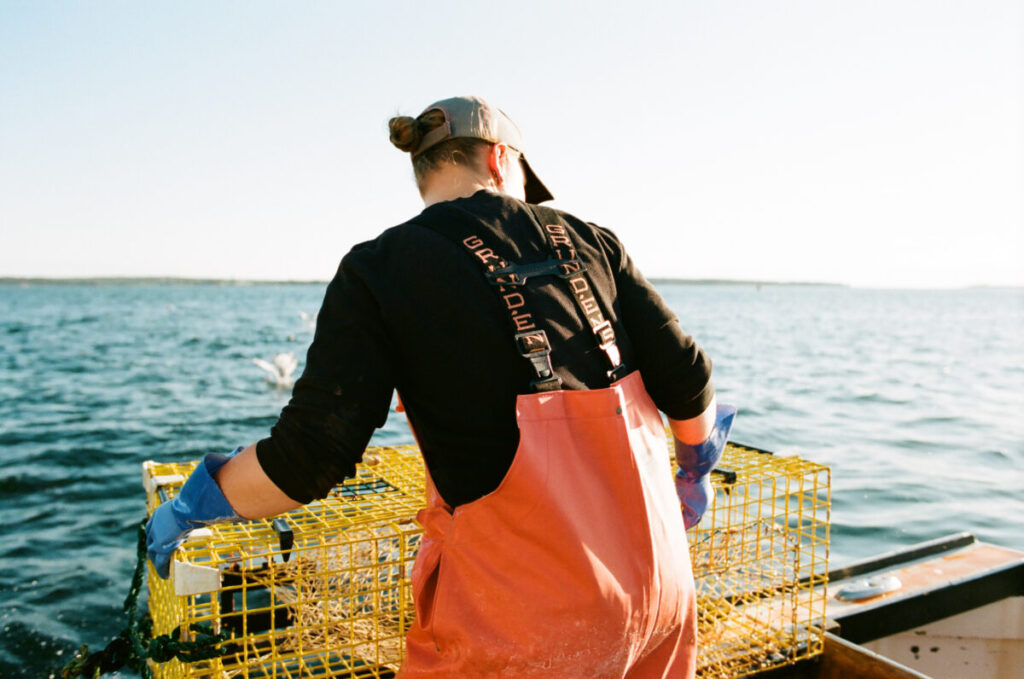

AND that 100 year-old lady . . . OMG! What a treasure and gift she is!
p
Seriously! A national treasure!
What a treat it was to read this experience. I was right with you, Hannah, as you moved (or stood still) in the boat. I thought of myself as the fisherman was telling you to “not move,” and me being me – I might have lifted my foot (if just a little) for fear of getting trapped among that line you spoke of.
I did photography for many years as a hobby and found that I enjoyed it tremendously. I believe I have a good eye for it and a sense of people (as I enjoy them too).
I gave it up because of time and my sister and her daughter have been doing photography professionally for several years now (with new and better equipment for sure).
So glad I took the time to read this interview. Thank you so much for sharing your experience. I could only imagine . . . and your words brought the experience to life.
Paula!
Wow. What a beautiful story! You know the saying, once a photographer, always a photographer? That’s you. Never a bad time to play with your favorite creative hobby/ pick up a camera again. Even w/ your phone! I’m always surprised how my photographer friends can capture the same object as me and have a completely different framing/perspective (much more skilled and artistic!) than I.
Thank YOU so much for sharing. Thank you so much for reaching out and connecting with this community (which you are now apart of and welcomed with open arms)! And thank you so much for taking the time to read! We would love an update when your hobby calls to you again! No pressure and you got this 😄.
💗📸🐟,
Megan